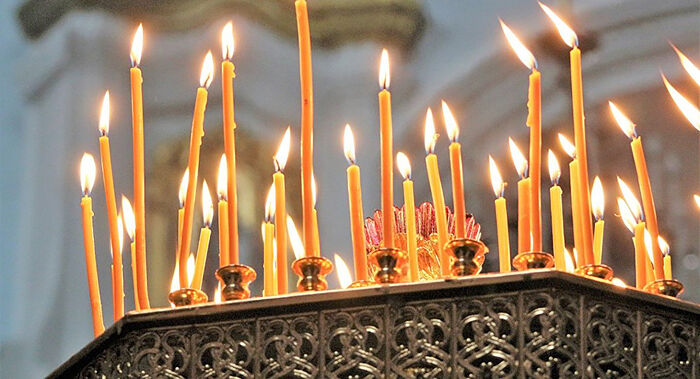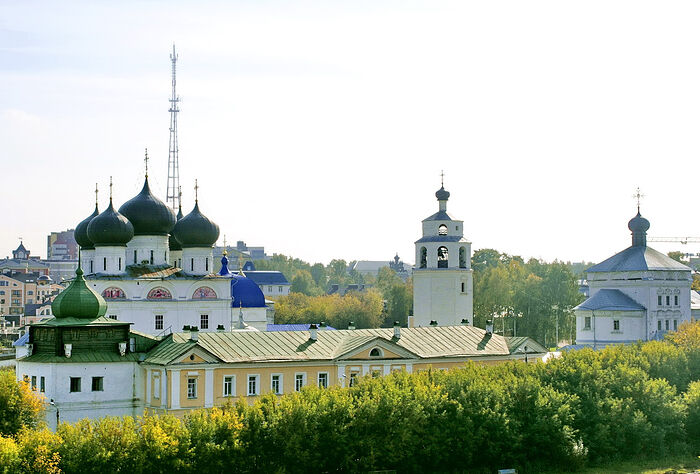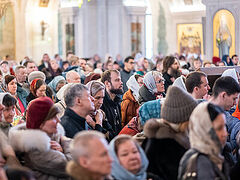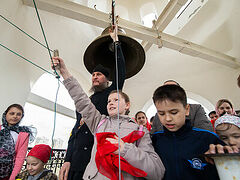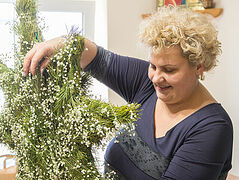—What are the most challenging aspects of your role as a church accountant? What helps you overcome the difficulties?
—There isn’t a notable distinction; professionalism is important whether you work in the Church or in secular organizations. We must apply the knowledge we’ve gained to serve the Church. Every task must be executed with precision, professionalism, and diligence, whether it’s serving in the altar, cleaning floors in the church, or working in the church store. Everything we do should be done for God. This includes correct and proper accounting.
Accounting for a church is simpler than regular accounting, but the work is more multifaceted and accountants have to solve many organizational, personnel, business and even legal issues. They must grow professionally and learn new things. When working for the Church, we must be prepared to undertake any task and not consider any kind of work to be beneath us.
And our faith and prayers will help us overcome any difficulties.
Supporting the Church
—Why is the tradition to light candles before icons so important and why have the Orthodox have kept it since ancient times?
—We all know that the candle is a symbol of a sacrifice to God. Christ said, “I am the light of the world” (John, 8:12). In the Old Testament, the candle signified the presence of God. The worship services of early Christians were held at night and candles were used to illuminate the surroundings. Later on, candles began to be used in church, and now we light oil lamps and candles to symbolize our heartfelt prayer to God.
The Church relies solely on donations for its support
This symbolism also holds practical significance. The Church represents our collective endeavor, and it is essential for everyone to participate in worship services. Nowadays, we have lost a sense of community; when we’re in church, we often don’t know the people who are standing next to us. This shouldn’t be the case, as we should all take an interest in each other and come to church for the common cause of prayer and ministry. In the past, parishioners would supply flour and church wine for worship services. Now these tasks are carried out in an organized manner, including baking prosphoras and purchasing church wine, frankincense, oil, and other essentials. The Church relies on donations from parishioners to carry out these tasks. The Church building requires heating and lighting, so we need to pay for these services. The building is huge, so it requires ongoing repairs and incurs considerable expenses for maintenance. Many things are needed to make sure that worship services can take place, and this includes dealing with the commercial issues and payroll. So lighting a candle is a small contribution you make to support the Church, ensuring that the prayers go on and the Church continues to exist. The Church is not financed by the government and receives no allocations from the budget. It relies solely on donations for its support.
The Church’s interests are not protected by the government, and there are people who sell candles and church wares without authorization. Not realizing that the Church relies on donations to operate, parishioners might purchase candles from beekeepers at the market. Then they would place the candles on the candlestands in the church without understanding that they haven’t made a donation to support the Church.
We must be honest with God. If you think that you can’t afford to buy a candle or make a donation at the moment, it is better to pray and say, “God, all I have is a repenting spirit. Help others donate to the church to support its needs.” There is no point in bringing the candles bought in a market or in a commercial shop, because this supports businessmen who often do not share the Church’s values.
—People might believe that God is above everything and everyone, so they simply don’t consider such nuances.
—Benefactors are specifically mentioned during every Great Entrance in the Divine Liturgy: “the builders, decorators, donors of this holy church, you, and all Orthodox Christians…” For ages, the Church has been emphasizing the need for benefactors and donors, praying for them regularly. How could anyone overlook that?
It’s important to be a part of the Church. Consider the word “счастье” (happiness)—its root is “часть” (part). This implies that we find happiness when we are a part of something meaningful to us. The word “Причастие” (Communion) also shares the same root “часть”. When we recite the Creed, we say “in One Holy, Catholic, and Apostolic Church...” We must understand that we are a part of the Church headed by Christ. If we believe that we are a part of this Church, we must contribute by praying in churches and giving donations for their maintenance. It’s simple.
—Please tell us about the economics of a large parish.
According to the Charter, the church’s chief accountant’s title is Treasurer, i.e. the “holder of funds”. The treasurer’s responsibilities combine the functions of an economist and an accountant. In non-religious organizations, an economist handles planning and estimation, while the accountant works with factual data calculating the financial results once a business transaction is completed. In a parish, you have to be an economist and an accountant. The amounts of donations can vary greatly. We know that January typically sees the highest income, while February often brings lower donations coupled with higher heating expenses, so we always have to set aside some January donations for February to create a financial buffer.
A parish is a business, just like any other legal entity. The church building has maintenance expenses that may not be immediately apparent, but when we walk into a church, we see church workers, clergy, and choir members, who, like anyone else, have utility bills, children and financial needs. Naturally, the church must pay their salaries.
Vladyka, as a skilled manager, organized accounting in the Vyatka diocese administration office and parishes. Transparent and easy—to—understand accounting system has been implemented. All parishes of the Vyatka diocese have accounting and cash transaction procedures in place, including accounting for candles and requests for prayers and rites.
A church is an employer, just like any other legal entity
Of course, there are people who volunteer their time and efforts for the glory of God. These are great people and we appreciate their help. However, most parishioners, especially young people who have no other sources of income and need to support their families are paid for their services. The churches pay their employees without delay, deducting insurance fees from the salaries and withholding personal income taxes. A church is an employer, just like any other legal entity. We need to plan the allocation of our funds, prioritizing payroll and tax payments in the parishes. Once salaries and taxes are paid, we address utility bills, and only then do we allocate funds for necessary purchases and repairs, if there are any remaining funds. We always strive to live within our means to ensure that the parish does not accrue any debts.
It would be wonderful to have funds for development, but maintaining churches, especially large buildings with numerous auxiliary offices, has always been challenging. We always hope that people would assist in the upkeep of these large church structures, as it involves a considerable amount of work that may not be immediately apparent.
—What myths about “parish wealth” have you heard? How would you debunk them?
—When people come to church on feast days and see parishioners making donations, they might assume that the Church has a ton of money. In such cases, we explain that we have to pay for utilities (heating, power, and water supply), security, video surveillance, Internet, garbage removal and many other services. Considering the church’s size, you can imagine the magnitude of our expenses. Think about your utility expenses in January—you know that they are not small. When we explain this to people, they understand the heavy burden we carry and start to wonder how we survive without government assistance.
—What are people more inclined to donate for? Can you illustrate this with an example from one of the churches?
—When additional donations are needed for maintenance, purchasing churchware, or painting the church, the parish council puts up a collection box with the information about the purpose of the collection. The information about the collection is also published on the parishes’ websites and bulletin boards. Since these are targeted donations, they are recorded separately and used strictly for their designated purpose. Parishioners are more inclined to donate to the repairs because they want their church to be beautiful.
—Does the parish of the St. Panteleimon Church have any social projects? What difficulties does it face?
—Parishioners of every church try to open a Sunday school to preach about the Resurrected Christ. God came to sow the Word, and we need pass this Word to our children, teach them how to live, foster their aspirations, and help them find faith in Our Lord Jesus Christ. However, finding a suitable location for the Sunday school always poses a significant challenge.
The St. Panteleimon Church in Kirov has a two—storied administrative building housing the offices of the priest, superintendent, and accountant along with such facilities as the priests’ room, dining room, library, and children’s Sunday school that includes seven classrooms. This building also serves as a venue for the adult Sunday school classes, folk choir rehearsals, and youth gatherings. Naturally, this building is not enough for us, so the St. Panteleimon Church has been wanting to build another Sunday school building for many years. Such a project entails significant expenses, but discussions are underway, considering the available land owned by the parish for potential expansion.
As for other churches, like the Church of the Nativity of the Most Holy Mother of God situated in the newly developed and densely populated Chistye Prudy microdistrict, there’s a pressing need for a dedicated administration building. Currently, their Sunday school sessions are conducted in cramped spaces unsuitable for children’s classes. While there is a high demand for Sunday school programs, the church struggles to fully accommodate it. Almost all parishes face similar problems.
Hard Times
—How do parishes help people in difficult situations?
—During times of hardship, the head of the Russian Orthodox Church, His Holiness Patriarch Kirill, always calls for fundraising efforts. The churches of the Vyatka diocese have collected donations for the refugees from Donbass, the victims of floods in Khersonskaya and Zaporozhskaya provinces, large families, and victims of fires. The collected donations are then forwarded to the diocese, which channels the funds in a centralized manner to the designated accounts of the Social Services Department of the Moscow Patriarchate.
—You’ve been working in the Church since 2011, that is you’ve worked there for more than nine years. When did you experience the most financially difficult period? What helped you overcome the difficulties?
—The most challenging period we experienced was probably during the Coronavirus pandemic. The Dormition Cathedral was the first to experience the decline in parishioners and, consequently, donations. Starting from February 2020, there were insufficient funds to pay for heating, power and water, so the Dormition Cathedral published a plea for financial assistance on its website. I would like to thank everybody who donated, as their contributions enabled the cathedral to settle its debts with the utility companies. By May/June 2020, all outstanding debts for the winter season had been fully repaid.
—Has the introduction of plastic cards simplified church accounting, or has it complicated the financial activities of the parish?
Many people think that we still use abacuses in our churches, but that’s not the case
—In terms of worshiping God, the Church has remained constant. For example, the liturgy of St. John Chrysostom has been performed for many centuries. The same worship texts have been used, and nothing has changed. In all other areas, such as maintenance, information management, legal matters, and accounting, the churches of the diocese are keeping pace with the times. Many people think that we still use abacuses in our churches, but that’s not the case. The Church pays taxes just like any other taxpayer. The church treasurers use 1C accounting software and e-document management systems. The churches entered into merchant acquiring contacts with banks and the use of plastic cards in the churches of the diocese has become commonplace. During the Covid pandemic, we had to install terminals in the church stores so that people could use their plastic cards to make donations. After using a bank terminal, parishioners receive donation receipts. This made church accounting more complicated, but the treasurers learned to handle the new tasks.
—Do you need to provide reports to the donors detailing how their donations were used, or do they have complete trust in the parishes?
—If someone makes a donation for a specific purpose, the funds must be used strictly as directed. Donors see the outcomes of the projects funded by their donations and don’t request formalized reports.
The Vyatka diocese oversees the allocation of targeted funds. At the end of each fiscal year, parishes report their donation receipts and expenditures to the diocese. Thankfully, there have been no instances of mismanagement.
A Beautiful Church in Chistye Prudy
—You are also responsible for the accounting of the recently built Church of the Nativity of the Most Holy Mother of God in Chistie Prudy microdistrict. Can you tell us what funds were used to decorate it?
—The church construction began with the blessing of Metropolitan Mark of Vyatka and Sloboda. Kirovspetsmontazh construction company, headed by Alexey Semenovich Mironov, started the work in 2013 and completed the construction free of charge.
Metropolitan Mark blessed the appointment of Vitaly Lapshin as the priest of the church and I assumed the role of the treasurer while it was still under construction. The parish of the Church of the Nativity of the Holy Mother of God was officially registered with the Ministry of Justice on October 31, 2014. Regular worship services were conducted throughout the construction phase, initially in a tent, then in a basement, and later in the antechurch, attracting a steady group of parishioners to the church.
The donations started coming in, and we used the money to gradually acquire churchware. We knew that when the construction is finished, it won’t be easy to buy all the required church wares at once. That is why, while the construction was still ongoing, we purchased the 540-liter holy water tanks, baptismal font, shroud reliquary, Eucharistic sets, memorial candle rack, altar crosses, and liturgical vestments and books. The parish opened a current account in the bank, and donations were accumulated there for several years. When the building of the church was complete, these funds were used to install granite floors, paint the main dome of the church, and decorate the altar. A portion of the funds for this work was a personal donation from Metropolitan Mark.
The construction of the church was finished in 2022, and preparations were underway for the dedication services. The altar, table of oblation, sanctuary lamp, altar Gospel, the Book of the Apostles, candleholders and other church utensils were purchased using the funds provided by the Vyatka diocese. The diocese also purchased the liturgical vestments of all colors, carpets and runners, wall—mounted oil lamps, and many other items.
The painting of the western wall of the church and the wall pilasters is currently underway, financed by the parish funds. Additionally, contracts have been signed for mosaic work on the western wall at the entrance to the church, and an order has been placed for making the large church chandelier which will be covered by Kirovspetsmontazh construction company. Most importantly, daily prayer services are held in the church in Chistye Prudy, and new parishioners continue to join.
The Tradition That Feeds Your Soul
—You are attending the course organized in the Center for Training of Church Specialists by the Vyatka Diocese of the Russian Orthodox Church. What did you learn during the training? Who would benefit from attending such courses?
We shouldn’t stop in our development. Instead, we should continue to know God as this journey is never—ending
We shouldn’t stop in our development. Instead, we should continue to know God as this journey is never-ending. Naturally, we need to know about our saints. The courses organized for the lay people in the Vyatka Seminary are very interesting.
The lectures are delivered by highly qualified teachers who are certified experts in their respective fields. The teaching team includes hieromonk Nikolai (Belev) M.Th,, dean of the Dormition Cathedral of the St. Tryphon Monastery and Natalia Viktorovna Krivosheina, D.A. Natalia knows everything there is to know about St. Tryphon! She has visited all the places where he labored and churches where he preached at. She knows all of this icons. N.V. Krivosheina defended her doctoral thesis on the decorations of the Dormition Cathedral in Kirov.
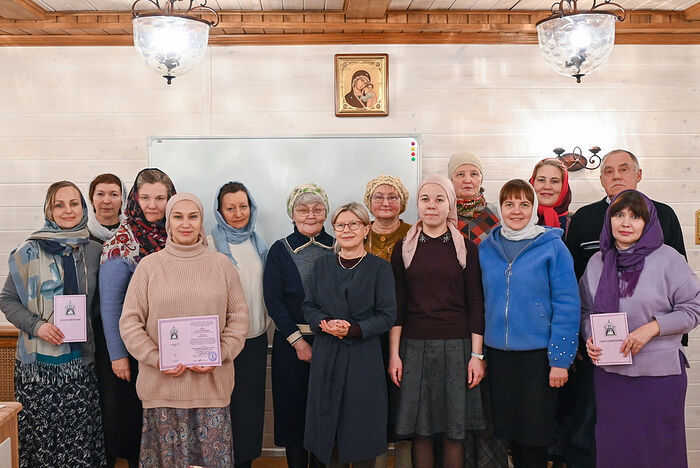 Instructor N.V. Krivosheina with graduates of the course for lay people in the Center for Training of Church Specialists of the Vyatka Diocese
Instructor N.V. Krivosheina with graduates of the course for lay people in the Center for Training of Church Specialists of the Vyatka Diocese
Among other interesting instructors are Elena Vitalyevna Kustova, DHS (senior lecturer, renowned author of the History of the Dormition Cathedral of St. Tryphon Monastery in Vyatka), Olga Vladimirovna Krupina (head of the Science and Exhibitions Department of the Vasnetsovs Vyatka Arts Museum and Deputy Director, Science and Methodology), Vlada Anatolyevna Devonina, Cand. Phil. Sci. (head of Correspondence Department, the Center for Training of Church Specialists of the Vyatka Diocese of the Russian Orthodox Church).
During the lectures, students find solace for their souls. At the end of the day people may feel tired and reluctant to attend, but once they enter the classroom, they forget about their daily hustle and fatigue.
Our time is unique in that the sermons of well-known missionaries are easily accessible. You can come home and listen to a sermon delivered in Optina Pustyn or on Valaam… However, nothing can replace the personal interaction people experience during the courses. Conversations with other students and the traditional interaction between teacher and students are essential, as they both educate and supports us. The teachers that deliver lectures are fountains of knowledge.
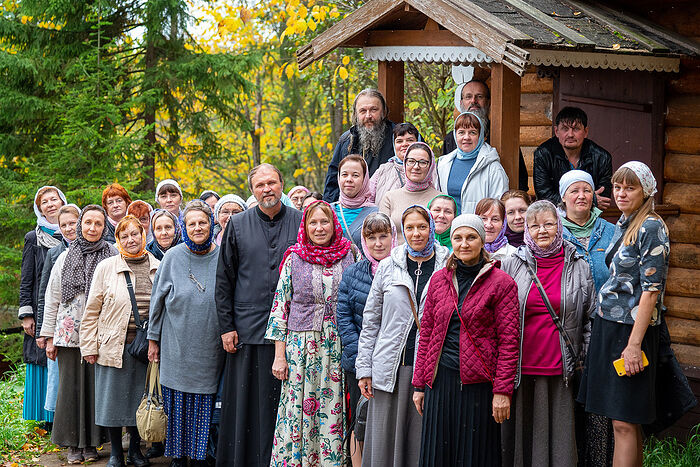 On a pilgrimage to the sites associated with the life of St. Tryphon of Vyatka
On a pilgrimage to the sites associated with the life of St. Tryphon of Vyatka
—In September 2023, you joined the employees of the Holy Dormition Cathedral on a pilgrimage to the sites associated with St. Tryphon of Vyatka. Please tell us about this trip. Does your parish plan any similar trips?
—We decided to go on a pilgrimage after Elena Vitalyevna Kustova’s lecture on St. Tryphon of Vyatka.
I met Nadezhda Feliksovna Shapoval, the head of “S Vyatki” pilgrimage service and asked her why there were no organized trips to the sites associated with St. Tryphon. She told me that they had struggled to find enough pilgrims to form a group. I proposed the idea of forming a group consisting of employees of our churches. Our staff members were delighted at the opportunity to participate in this journey.
The pilgrimage to the sites associated with St. Tryphon of Vyatka was attended by forty—eight employees from the Dormition Cathedral, St. Panteleimon’s Church, and the Church of Nativity of the Holy Mother of God in Chistye Prudy. During this journey, we experienced profound spiritual fulfillment and gained a deeper understanding of the life and deeds of St. Tryphon. The pilgrimage was guided by Fr. Alexander Kossov and Fr. Alipiy (Storozhuk).
Such pilgrimages should indeed become a tradition. We are currently planning to organize a similar trip in 2024. We need to know the saints from Vyatka and learn about the places associated with their lives and deeds. In Kirs, situated in the northwest of Kirovskaya Oblast, there is a Church of the Protecting Veil where special rites are performed to commemorate the new martyrs, as a Vyatlag (forced labor camp—Translator) was located in this area. The Church of the Protecting Veil of the Mother of God has also established a Vyatlag museum.
In accordance with the blessing of Kirill, the Most Holy Patriarch of Moscow and All Russia, the feast commemorating the new martyrs and confessors of the Vyatka Metropolitanate is observed on a diocesan level. Many of these saints endured hardships at Vyatlag, so it is important for us to visit these sites and pay homage to their memory.
—What was the most memorable pilgrimage in your life?
—My first pilgrimage. It was 2002. I went to Diveyevo with pilgrims from Izhevsk. Back then, Diveyevo, the monastery of St. Seraphim, lacked the grandeur it boasts today. Our accommodations were humble, consisting of large rooms furnished with bunk beds, and meals were served in an outdoor dining hall. In other words, the conditions were quite austere. However, the sacred atmosphere imbued with the grace of God had a profound impact on us. We felt as though we were in another world and didn’t want to leave this monastery.
While modern—day pilgrims are often awed by the beauty and splendor of Diveyevo Monastery, in the 2000s, during its restoration, we were more captivated by unforgettable spiritual impressions. I met my first spiritual friends during that trip and we’ve been keeping in touch since then.
—Do you have any time left for something that feeds your soul? How do you recharge and where do you find inspiration?
Working in the church is what feeds my soul
—I think that working in the church is what feeds my soul. Despite the weariness that may come from my daily routine, the constant stream of information, or the interactions with countless people, I never tire of working in the church. Work and prayer bring fulfilment to my life.
Certainly, maintaining professional, spiritual and physical well—being is essential. That is why I make an effort to visit the women’s fitness club gym. For spiritual nourishment, I carve out time for reading; it’s always a refreshing activity. And, of course, the most precious to me is spending time with friends. Trips back home are always rejuvenating, providing an opportunity to reconnect with relatives and close friends.
—With spring just around the corner, what can you say to inspire our readers?
—I would like to emphasize that this is the golden age of the Church. Why? Because never have there been so much accessible information, such as patristic books and literature. We have the freedom to read whatever we desire, which is especially precious after the constraints of the Soviet era.
The churches are now open, and we are free to attend worship services, and engage in reading, study, and reflection. A candle lights up brightly just before it goes out. So who knows how long this time will last? That is why we need to appreciate this and find time to serve God and feed our souls. We must be aware of the passage of time, and I pray that everyone has the opportunity to offer their sacrifices to God, both through their work and their prayers.

